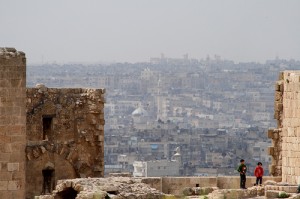“No picture is worth my life”, states Achilleas Zavallis, a Greek photographer working in Syria. He and Richard Spencer, Middle East Correspondents for the Daily Telegraph, speak in an interview of the complexities of reporting in Syria, offering not only their views of the conflict, but also a revealing glimpse into the thoughts and experiences of those on the ground writing and photographing our news.
Achilleas is clear in his approach to the conflict: he is there simply to capture the events unfolding before him. “I’m not in Syria to take sides or play a role in the fight against Assad. I’m there to document what is happening on the ground and try to show how the conflict is affecting the civilian population… I will accept a certain amount of calculated risk in order to get the pictures and tell the story but from then on I will pull myself out of the situation.” Richard sees broader implications to his work: “There is no simple “moral stripe” to what I or we do. I prefer to think of myself as doing my job… But I think that all reporting has big political and even philosophical consequences and so there is a broader moral dimension.”
There are no simple moral dichotomies in this conflict, but what reporters are allowed to witness indicates the ethical climate. Richard recounts: “When I was in Damascus I was stopped at a checkpoint and taken to a military intelligence barracks to have my papers checked. There were some men being beaten up in a courtyard there: I thought that was a telling sign, that this was so normalised they didn’t think anything of letting a western journalist see it.”
Yet while Richard argues that pro-regime forces, mostly the militias known as “shabiha” have carried out the most and worst atrocities, he has also interviewed rebels who have executed captives with no due process, or have overseen sham “trials”. Achilleas agrees: “In some situations in war there is black and white, and then there are a lot of grey areas. Who we call “terrorist” today becomes our “partner” in the future,” and vice versa.
Indeed, what reporters see and do not see reflects the sophisticated public relations of morality deployed by the rebels. Despite committing mass murders and executions, many of the rebels are keen to demonstrate how well they treat prisoners. Richard points out that there’s a silver lining: “Obviously there is PR there but at least they have an understanding of what standards they should be aspiring to!”
The most powerful aspect of the reporters’ experiences is the human relationships they form in the region. Richard tells a story of the way people with little in common on a personal or political level are brought together through the conflict: “I was interviewing a rebel officer in his headquarters when it was bombed from the air – the bomb missed by 20 yards but blew out the windows. I ended up under the desk with him. We found ourselves holding each other’s hand, oddly.”
Both journalists speak of experiencing the hospitality of Syrian civilians, reflecting the general Arab culture of hospitality towards strangers. But welcoming journalists does not necessarily imply a desire for the end of the regime. Achilleas says that somewhere in the region of 30 to 40 percent of Syrians support Assad, with most of them “Alawis, Shi’a, Christians, and a small percent of Sunni that stand to lose a lot from a change in the status quo”.
The very notion of “support” holds a range of meanings in Syria. “Supporting the system is different from supporting the people in charge of it”, Richard points out. “Some people in Syria don’t support democracy but would prefer a different autocrat; quite a lot of people wanted democracy but in the range of dictators didn’t feel Bashar was too bad. Others didn’t like either but preferred the status quo to the risk of violent change.” Indeed, he suggests that “there’s also a significant number of people on the rebel side who say they would never have started it if they had known it would be like this, but believe there is no direction now but forwards”.
And yet day-to-day routine continues amongst Syrian civilians. According to Achilleas, “shockingly close to the front line, quotidian Aleppo perseveres – shops are open 100 yards from a sniper’s alley, with mortars going off all around. People still attend Mosque in considerable numbers, and in the “liberated” countryside schools are restarting.”
As a photographer Achilleas wants to observe and communicate these human interactions to his audience. Spending lengthy periods of time with various rebel groups, his subjects can forget the presence of the camera and slip into habit – “I like the people I photograph to forget that I’m there.” Reporters too are dependent on effective personal relationships with locals and translators. Richard has a “good relationship with a couple of guys in Aleppo – I can actually be a war day-tripper, which is admittedly unusual.” Achilleas’ ability to get into the region in the first place was also dependent on his “contact” putting him in touch with a “smuggler”. This is how international media presence now at work in Syria operates: via hundreds of inter-personal communications and relationships.
The picture painted by Achilleas and Richard of Syria is complex and unlikely to become much clearer in the coming months. Achilleas believes that “this is a war that will last for many years and will go through many phases before we see an end to the conflict”. But there is a suggestion that the hundreds of thousands of human interactions in Syria, of which the press are a part, are leading towards some sort of conclusion. Richard suggests “there will come a tipping point, as there did in Libya. My personal view is that this is between three to six months away. After that, though, it’s anyone’s guess.”




